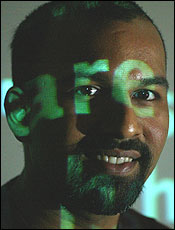|
DISPATCH
Mark Your WordsIs creating a taped record of your every conversation a smart idea? One MIT researcher thinks so.Driving home from a dinner party, you turn to find your wife glaring at you. "I can't believe you said that to my boss," she says with a huff. You're certain she misheard you. But how do you settle the standoff?
If Sunil Vemuri has his way, all you'll need to do is go to the tape. A doctoral candidate at MIT's Media Lab, Vemuri has spent the last 2 1/2 years creating and refining a "memory prosthesis," a cool tool designed to let you tape-record your entire life and, more important, be able to find, with Google-like ease, any snippet of conversation you had at any time. His prosthesis could someday change our lives in ways big and small. Besides settling spousal arguments, it could improve health care by allowing patients to review their doctors' hurried instructions in the comfort of their homes. It could improve justice by serving as a check on the phenomenon of falsely recovered memories at play in some sexual abuse cases. It could even improve office efficiency by allowing employees to review instructions for fixing the copy machine when the guy everyone counts on to get them out of a jam is on vacation. The tool beams digital recordings from a hand-held personal data assistant, or PDA, to a server and then uses voice-recognition software to convert the sound into a searchable database. It is still pretty crude. These days, using it to find exactly what you're looking for has the frustrating hit-or-miss quality of searching for a particularly obscure title in a particularly disorganized used-book store. No matter. In time, the process will become faster and more efficient. Whether it will ever reach the level of ease and intuitiveness required to become a life-changing technology is still an open question, but maybe, in the meantime, we might want to tackle another one: Do we want this technology? When e-mail first took hold, it brought an almost real-time pulse to our correspondence - while providing a searchable electronic paper trail to boot. But then came the stories of employees seeing their dashed-off e-mails turn into permanent pain as they were subpoenaed in court battles or preserved in human-resources files. Nowadays, we're all more guarded at the keyboard. Imagine a world in which every conversation is recorded - by both parties. Would we begin to walk through life as though it's one long deposition, choosing our words with a lawyer's care? And do we really want to remember everything? Daniel L. Schacter, a Harvard psychology professor and memory specialist, cautions that sometimes, especially in the case of certain traumatic memories, it's good to forget. "Persistent, intrusive memories that we can't get rid of can be quite disabling," he says. Vemuri is mindful of these concerns, and by now, the 34-year-old researcher is well versed in both memory science and privacy law. He stresses that his prosthesis would be simply a memory aid, not a replacement. And to guard against the transcripts being subpoenaed down the line, he is now contemplating a process in which the recordings and transcripts would be automatically deleted after a certain period and only summaries or "memory triggers" would be retained. Then again, those concerns are still very much in the land of the hypothetical. First, he has to make his process a lot more usable. To that end, Vemuri has spent the last two years recording many of the conversations he has with his MIT colleagues, from whom he has secured written releases. But he has no doubt that his memory tool could also be useful in his family life. Vemuri's two sisters recently argued about a Star Trek doll they had as kids. "My younger sister thought it was Spock. My elder sister thought it was McCoy," he says. "I had to break the tie." His hunch was that it was McCoy, but if he had a memory prosthesis from childhood to fall back on, he could find the definitive answer.
Then again, definitive is still out of reach. The transcript of a recent conversation in which he recounted his sisters' debate reveals that his voice-recognition software turned the words "my younger sister" into "Mike Myers." |
